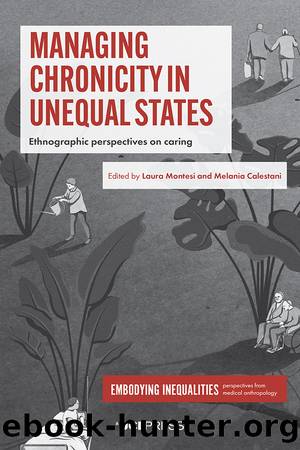Managing Chronicity in Unequal States by Laura Montesi Melania Calestani

Author:Laura Montesi, Melania Calestani [Laura Montesi, Melania Calestani]
Language: eng
Format: epub
ISBN: 9781800080317
Barnesnoble:
Publisher: U C L Press, Limited
Published: 2021-11-22T00:00:00+00:00
The reduction of institutional care and the âNGOisationâ of the nation state
In the 1970s, the socialist government of Tanzania under President Julius Nyerere (1964â85) suffered from growing external debt and exploding costs in its heavily subsidised economy and over-funded external systems. The international oil crisis and global economic depression further exacer-bated this situation. With the end of the Nyerere era and the election of President Ali Hassan Mwinyi in 1985, the Tanzanian state accepted the World Bank and International Monetary Fundâs structural adjustment policies. This political decision marked the start of the countryâs neoliberal phase, and the implementation of various types of economic reforms concerning the implementation of cash economy, trade liberalisation, deregulation of foreign investments, and para-statal and civil services. The adoption of these economic and political measures caused a steep reduction in governmental expenditures for health care, education and housing programmes. As a consequence, the Tanzanian state started to greatly rely on external socioeconomic support from international institutions and NGOs for services, and international private companies for industrial development (Dilger 2010, 103â4).
The years from the 1970s to the 1990s, however, constituted an important period for the legal and political recognition of people with albinism and disabilities in Tanzania. Under the Nyerere government, the Tanzania 1977 Constitution prohibited discrimination against people with disability (Aldersey and Turnbull 2011, 161â2). Through a series of subsequent legal acts, people with albinism and other disabilities (deafness and blindness, for example) succeeded in constituting their first organisations. Under the Nyerere governmentâs motto of self-reliance (kujitegemea), freedom (uhuru) and national unity (umoja), people with non-normative bodies were considered to belong to the Tanzanian national community at large (Nyerere 1966). The Tanzania Albinism Society (TAS) was one of three state-funded organisations. Founded in 1978, TAS was categorised by the state authorities as a Disabled Peopleâs Organisation (DPO). My interlocutors with albinism did not agree with this classification, as they believed that the label âdisabilityâ could add even more social burden and stigma to their daily experiences. Between the 1980s and the early 2000s, a series of international documents, declarations and legal acts for the enhancement of human rights for people with disability were promulgated (Ingstad and Whyte 2007, 4â5). Post-Nyerere governments in Tanzania later ratified these official documents (Aldersey and Turnbull 2011, 160). The Disability Act of 2010 is the most recent legislation that attests to the right of people with a disability to make human rights claims and demand protection.
Despite the promulgation of these legal acts, the Tanzanian state continued to reduce funding for the welfare, health care and education systems, and awareness activities by many national DPOs. Instead of being administered through public funds allocated by networks of state-supported health facilities and the former Ministry of Health and Social Welfare (Wizara ya Afya na Ustawi wa Jamii), the material forms of care and economic relief for disabled individuals and people with albinism and/or other chronic conditions began to depend solely on their families, religious congregations, international NGOs and informal networks of community solidarity and mutual help.
Download
This site does not store any files on its server. We only index and link to content provided by other sites. Please contact the content providers to delete copyright contents if any and email us, we'll remove relevant links or contents immediately.
Cecilia; Or, Memoirs of an Heiress — Volume 1 by Fanny Burney(32527)
Cecilia; Or, Memoirs of an Heiress — Volume 2 by Fanny Burney(31928)
Cecilia; Or, Memoirs of an Heiress — Volume 3 by Fanny Burney(31916)
The Great Music City by Andrea Baker(31902)
We're Going to Need More Wine by Gabrielle Union(19020)
All the Missing Girls by Megan Miranda(15892)
Pimp by Iceberg Slim(14464)
Bombshells: Glamour Girls of a Lifetime by Sullivan Steve(14039)
For the Love of Europe by Rick Steves(13824)
Talking to Strangers by Malcolm Gladwell(13332)
Norse Mythology by Gaiman Neil(13317)
Fifty Shades Freed by E L James(13216)
Mindhunter: Inside the FBI's Elite Serial Crime Unit by John E. Douglas & Mark Olshaker(9299)
Crazy Rich Asians by Kevin Kwan(9262)
The Lost Art of Listening by Michael P. Nichols(7480)
Enlightenment Now: The Case for Reason, Science, Humanism, and Progress by Steven Pinker(7288)
The Four Agreements by Don Miguel Ruiz(6729)
Bad Blood by John Carreyrou(6601)
Weapons of Math Destruction by Cathy O'Neil(6249)
